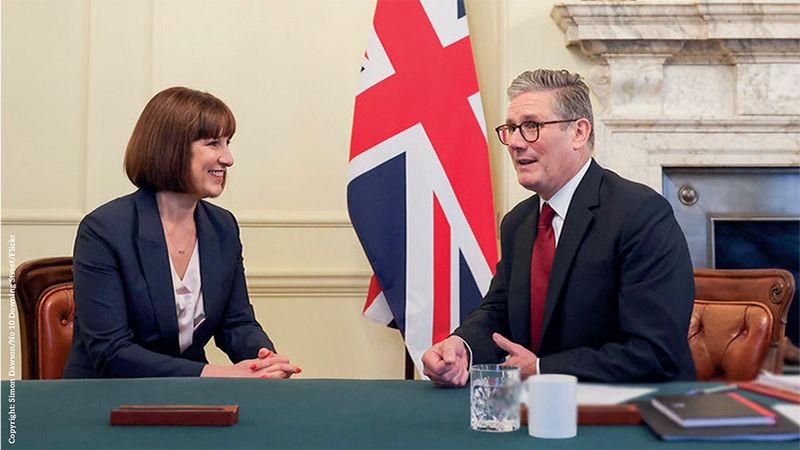The UK election result represents “an emphatic nod from voters of a desire for change”, according to investors, with private investment needed to meet the scale of ambition when it comes to energy transition.
From GB Energy to a mandate on FTSE 100 companies to develop and implement credible transition plans, and from easing planning restrictions on onshore wind to reinstating the 2030 ban on new petrol and diesel vehicle sales, Labour’s manifesto demonstrated “far greater ambition and clarity” on their commitments to advance the net zero and clean energy transition, said commentators. But the devil will be in the detail for some.
Talking about specific sectors expected to benefit from the new government, Matt Evans, portfolio manager of UK sustainable equities at Ninety One, focused on renewables, electricity networks and rail.
“Labour continues to put net zero as a central policy, given its importance to energy security and reducing energy bills. This should be positive for renewables and electricity networks, with Labour identifying the oil sector for further taxation. It has previously announced its Green Prosperity Plan via the creation of a National Wealth Fund and a public body (Great British Energy), funded in part via a windfall tax on energy firms and borrowing.
“Other policies announced include working with the private sector to double onshore wind, triple solar power and quadruple offshore wind by 2030. It also plans to invest in carbon capture and storage, hydrogen and marine energy, as well as long-term energy storage.
“Finally, Labour has spoken about its plans to nationalise the rail industry under Great British Rail. The rail network requires investment but is a key pillar of levelling up and moving towards lower-carbon transport.”
Lifting ‘ban’ on onshore wind
The new government has wasted little time acting on its key manifesto pledges. In her first major speech, chancellor Rachel Reeves announced sweeping reforms to planning restrictions while also ending the effective ban on onshore wind farms.
Tara Irwin, ESG analyst at Hargreaves Lansdown, said this “marks a significant milestone”, promising lower energy bills, enhanced energy security and a greener future for all.
“Retail investors have a unique opportunity to support the UK’s journey towards a zero-carbon electricity system while enjoying the financial benefits of an industry set for growth, with the potential for robust financial returns and portfolio diversification.
“The Labour government’s pledge to ‘make Britain a clean energy superpower’ underscores a transformative vision for the UK’s energy landscape. By working with the private sector to bolster wind and solar capacities, investing in carbon capture and storage and securing long-term energy storage solutions, the UK is laying the groundwork for a sustainable and resilient energy future.”
Natural capital and social impact
Elsewhere, Ruth Murray, investment director of sustainable infrastructure at Gresham House, noted how the introduction of a new Labour government “presents a real opportunity to solidify the UK’s position as a global leader in natural capital investment”.
“The government’s ambition to provide a stable policy environment is crucial to obtaining this, and at Gresham House, we strongly advocate for the continuation and ongoing establishment of mandatory regulatory frameworks for natural capital.
“These frameworks are essential for encouraging private capital investment by creating stable markets and providing the assurance investors need to commit significant resources to nature recovery. Such regulations will not only yield financial returns for investors, but also ensure the avoidance of further damage, reduction of unavoidable impacts, and restoration of natural habitats. Moreover, clear and consistent regulations will enhance the allocation of resources and expertise, addressing the current confusion caused by regulatory uncertainty.”
Meanwhile, the social impact investment sector “is ready to support” the new government, according to Stephen Muers, chief executive of Better Society Capital.
“By creating a policy environment that fosters social investment, the new government can leverage £50bn of additional investment to make a positive impact across the country. We look forward to collaborating with Sir Keir Starmer and his new government, helping to develop solutions for making tax-payer money go further, and making society better for all those living in the UK.”
Private investment and policy statements
Labour’s accelerated targets will be a challenge, according to Sam Hollister, head of market insight at LCP. GB Energy, in particular, is “an interesting proposal” that can “support delivery by co-investing and crowding in private sector funding”.
“We need to invest £430bn in decarbonising the power sector by 2050, and the State is not going to provide that level of funding, so the £8.3bn allocated to GB Energy needs the opportunity to play a pivotal role in bringing forward private investment.”
However, even additional funding and the new schemes outlined in Labour’s manifesto “would not be enough to reach the ambitious targets if operated in isolation”, concluded Hollister.
“All new schemes must be carefully coordinated to maximise synergies, and additional enabling steps must be taken. Planning consent and connection agreement processes are currently hindering the delivery of renewable projects. Setting out new national policy statements will therefore be crucial in speeding up the process.”








